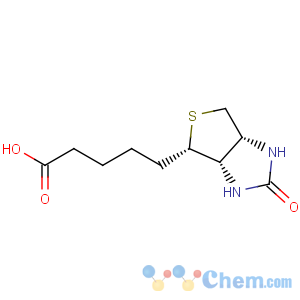D-Biotin
-
- Product NameD-Biotin
- CAS No.58-85-5
- Purity
- Min Quantity
- Price~

 View Contact Detail
View Contact Detail
-
 Molecular Structure
Molecular Structure
Detailed Description
D-BiotinBiotin (CAS: 58-85-5), also known as vitamin H or B7, has the chemical formula C10H16N2O3S (Biotin; Coenzyme R, Biopeiderm), is a water-soluble B-complex vitamin which is composed of an ureido
(tetrahydroimidizalone) ring fused with a tetrahydrothiophene ring. A valeric acid substituent is attached to one of the carbon atoms of the tetrahydrothiophene ring. Biotin is a cofactor in the metabolism
of fatty acids and leucine, and in gluconeogenesis. Biotin is necessary for cell growth, the production of fatty acids, and the metabolism of fats and amino acids. It plays a role in the Citric acid cycle,
which is the process by which biochemical energy is generated during aerobic respiration. Biotin not only assists in various metabolic reactions, but also helps to transfer carbon dioxide. Biotin is also
helpful in maintaining a steady blood sugar level. Biotin is often recommended for strengthening hair and nails. Consequently, it is found in many cosmetic and health products for the hair and skin.
USP28/EP5,99.0%.
1kg/aluminum tin,25kg/fibre drum